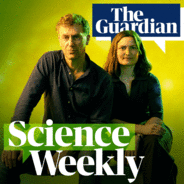Artificial intelligence companies have lofty ambitions for what the technology could achieve, from curing diseases to eliminating poverty. But the energy required to power these innovations is threatening critical environmental targets. Madeleine Finlay hears from the Guardian’s energy correspondent, Jillian Ambrose, and UK technology editor, Alex Hern, to find out how big AI’s energy problem is, and whether it can be solved before it is too late. Help support our independent journalism at theguardian.com/sciencepod

Wissenschaft & Technik
Science Weekly Folgen
Twice a week, the Guardian brings you the latest science and environment news
Folgen von Science Weekly
300 Folgen
-
Folge vom 16.07.2024Can the climate survive AI’s thirst for energy?
-
Folge vom 11.07.2024‘Lesbian’ seagulls and ‘gay’ rams: the endless sexual diversity of natureSame-sex sexual behaviours have been reported in a wide variety of species, and a new study suggests that, although animal scientists widely observe it, they seldom publish about same-sex sexual behaviour in primates and other mammals. To find out why and to hear about some of the examples of sexual diversity from the animal kingdom, Ian Sample hears from Josh Davis, a science writer at the Natural History Museum in London and author of the book A Little Gay Natural History. Help support our independent journalism at theguardian.com/sciencepod
-
Folge vom 09.07.2024ZOE and personalised nutrition: does the evidence on glucose tracking add up?You might have noticed that everyone has recently become a bit obsessed with blood sugar, or glucose. Wellness firms such as ZOE here in the UK – as well as Nutrisense, Levels and Signos – claim to offer insights into how our bodies process food based on monitoring our blood glucose, among other things. But many researchers have begun to question the science behind this. To find out what we know about blood glucose levels and our health, and whether the science is nailed down on personalised nutrition, Ian Sample hears from philosopher Julian Baggini, academic dietician Dr Nicola Guess of Oxford University and ZOE’s chief scientist, and associate professor at Kings College London, Dr Sarah Berry. Help support our independent journalism at theguardian.com/sciencepod
-
Folge vom 04.07.2024‘Spermageddon’: is male fertility really in crisis?Recent research has suggested a global reproductive crisis could be in the offing, with researchers in Israel saying average sperm counts may have more than halved in the past 40 years. But a study published last month appears to call this narrative into question. Ian Sample is joined by the Guardian’s science correspondent Nicola Davis to unpick why these studies have come to different conclusions – and what could be causing the crisis, if declines are as dramatic as they appear. Help support our independent journalism at theguardian.com/sciencepod
